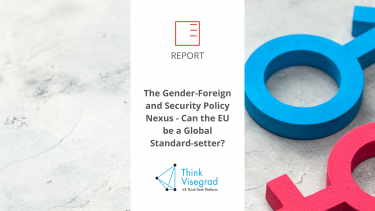Report | EU - India relations: A partnership beyond trade
The report provides a summary of a public event organized by EUROPEUM's Brussels Office, in collaboration with CEPS, as part of the Think Visegrad platform on November 27th. The event was named "EU-India relations: A partnership beyond trade." Panelists included Alica Kizekova, Senior Researcher at the Institute of International Relations Prague, Zsolt Trembeczki, Research Fellow at the Hungarian Institute of International Affairs (HIIA), and Fanny Sauvignon, Researcher at the Foreign Policy Unit of CEPS.
Show more PDFReport | The Gender - Foreign and Security Policy Nexus: Can the EU be a Global Standard-setter?
The report summarizes the debate held at a public event organized by EUROPEUM and GLOBSEC under the Think Visegrad platform on November 28th. The event focused on the ambitions of achieving a gender-equal Foreign and Security Policy within the EU and its potential to set global standards. The panel discussion featured insights from Jonna Neumanen, Vladislava Gubalova, and Danielle Piatkiewicz, moderated by Sofiia Shevchuk.
Show more PDFReport | The Gender - Foreign and Security Policy Nexus: Can the EU be a Global Standard-setter?
Report shrnuje debatu, která proběhla na veřejné akci pořádané Institutem EUROPEUM a slovenským think-tankem GLOBSEC 28. listopadu v rámci platformy Think Visegrad. Akce se zaměřila na ambice dosažení genderově rovné zahraniční a bezpečnostní politiky v rámci EU a její potenciál stanovit globální standardy. Panelové diskuze se účastnili: Jonna Neumanen, Vladislava Gubalova a Danielle Piatkiewicz, moderátorkou byla Sofiia Shevchuk.
Show more PDFEU-Pacific Talks | Charting the course for Ukraine: Reassessment of the Indo-Pacific
We would like to invite you to the next debate in the EU-Pacific Talks series, this time on the topic "Charting the course for Ukraine: Reassessment of the Indo-Pacific". The online debate will take place on Tuesday, 28 November, from 13:00 to 14:00 as an online stream on FB.
Show more
INVITATION | The Gender-Foreign and Security Policy Nexus: Can the EU be a Global Standard-setter?
We cordially invite you to a discussion with experts entitled "The Gender-Foreign and Security Policy Nexus: Can the EU be a Global Standard-setter?". Venue: The Library Europe, Avenue de Broqueville 40, 1200 W-S-L, Brussel
Show morePOZVÁNKA | The Gender-Foreign and Security Policy Nexus: Can the EU be a Global Standard-setter?
Srdečně Vás zveme na besedu s expertkami, která nese název “The Gender-Foreign and Security Policy Nexus: Can the EU be a Global Standard-setter?”. Místo konání: The Library Europe, Avenue de Broqueville 40, 1200 W-S-L, Brusel.
Show moreINVITATION | TAPF: Taking Stock of Transatlantic Relations
We would like to invite you to an event titled "Taking Stock of Transatlantic Relations", organized by EUROPEUM Institute for European Policy, the Atlantic Council, and the American Embassy in Prague as part of the Transatlantic Policy Forum conference. The discussion will take place on Thursday, 2. November at 15:00 in the American Centre in Prague.
Show more
INVITATION | EU±// The Nagorno-Karabakh conflict - how will it affect the situation in the region and the relations of the parties with the EU?
We would like to invite you to another debate in the EU± series, this time on the topic "The Nagorno-Karabakh conflict - how will it affect the situation in the region and the relations of the parties with the EU?". The meeting will take place online on Monday, 30 October at 17:30.
Show moreKyiv Independent | Russia, China and North Korea have a new dynamic. And that's bad for Ukraine
Our research Associate Tereza Novotná commented on the changes in North Korea's domestic politics and the gradual opening of the country to foreigners in a new article for Kyiv Independent.
Show more
REPORT | What future for QMV in Foreign and Security Policy?
The debate focused on the possible move to qualified majority voting in the EU's Foreign and Security Policy. The participants in the debate discussed the possible negative and positive aspects of the decision. The debate covered topics such as the fear of over-voting as a possible aspect of division within the Union or the ineffectiveness of the current consensus approach.
Show moreStaroměstské náměstí 4/1
Prague 1 - Staré Město
110 00
tel.: +420 212 246 552
email: europeum@europeum.org
https://www.europeum.org








